人教版四年级英语下册Unit 1 My school第一课时导学案及答案
- 格式:docx
- 大小:23.17 KB
- 文档页数:3
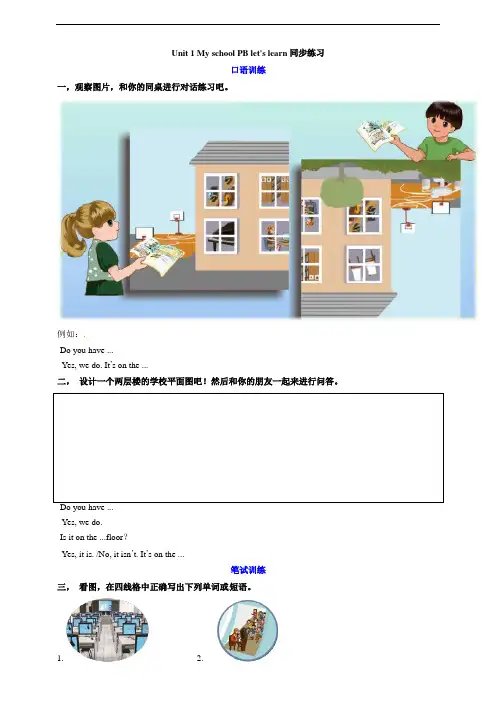
Unit 1 My school PB let's learn同步练习口语训练一,观察图片,和你的同桌进行对话练习吧。
例如:-Do you have ...- Yes, we do. It’s on the ...二,设计一个两层楼的学校平面图吧!然后和你的朋友一起来进行问答。
- Yes, we do.-Is it on the ...floor?- Yes, it is. /No, it isn’t. It’s on the ...笔试训练三,看图,在四线格中正确写出下列单词或短语。
1. 2.3. 4.四,选择题() 1. -Is it on the _____floor.A. one B.two C.second()2. -_____you have a playground? - Yes, we do.A. Do B.Are C.What() 3. -____ is the music room? - Next to the library.A. WhereB. HowC.What()4. We have _____ in our school.A.an libraryB. a art roomC. a music room五,按要求完成句子.1. room, is, The, on, the, art, floor, first, (.) 连词成句__________________________________2.Do you have a computer room?(肯定回答)__________________________________3.Is this the playground? (否定回答)__________________________________4.我们的美术室在音乐室旁边.(翻译句子)__________________________________六,阅读理解。
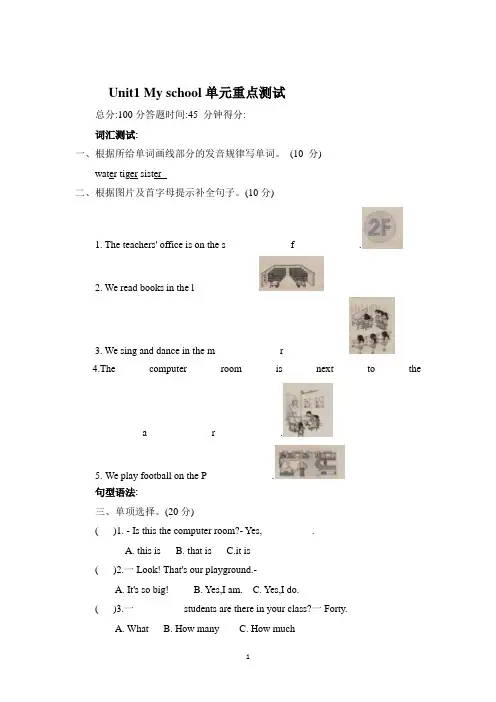
Unit1 My school单元重点测试总分:100分答题时间:45 分钟得分:________________词汇测试:一、根据所给单词画线部分的发音规律写单词。
(10 分)water tiger sister ______________ ______________二、根据图片及首字母提示补全句子。
(10分)1. The teachers' office is on the s_____________f_____________.2. We read books in the l_____________3. We sing and dance in the m_____________r_____________4.The computer room is next to thea_____________r_____________.5.We play football on the P_____________.句型语法:三、单项选择。
(20分)( )1. - Is this the computer room?- Yes,__________.A. this isB. that isC.it is( )2.一Look! That's our playground.-__________A. It's so big!B. Yes,I am.C. Yes,I do.( )3.一__________students are there in your class?一Forty.A. WhatB. How manyC. How much( )4.__________ my classroom.A. This'sB. They areC. This is( )5.一Where is the library?一It's__________the second floor.A. onB. inC. at四、按要求完成下列各题。

P E P四年级下册英语导学案全册集团标准化工作小组 #Q8QGGQT-GX8G08Q8-GNQGJ8-MHHGN#课题:Unit1Ourschool(一课时)学习目标(1)能够简单介绍学校校舍分布情况,如:This is the teacher’soffice .That is my classroom .(2)能简单说出每个课室的不同功能,如:Go to the library .Read a story-book学习重难点让学生熟练掌握“Thisis…Thatis…”的用法。
自主预习1、听录音,读一读playground teacher’s office gardenlibray canteen2、拼一拼,写一写computer board fans lightThis is my computer . That is your computer.3、听录音,跟读课文,与小组内同学互相评读,看一看,比一比,谁读得好.合作探究1.我能流利朗读“Let’s talk”和“ Readand write”的对话。
1) 自由读。
2)小组长或推荐优秀组员领读。
3)分角色表演对话。
4) 其他方式。
2.我会根据Let’s play中图示,设计对话,进行练习。
课堂检测一、选择填空。
()1. fl A. our B. oor()2. yo A. or B. ur() se A. ee() A. sh() teen A. en二、根据汉意写出下列单词写字板-- 电脑-- 讲桌-- 灯--图画-- 电扇-- 地板-- 墙--三、短语搭配( )to the teacher’s office. the flowers.( )2. Go to the canteen. B. Eat some noodles.( )3. Go to the library. football.( )4. Go to the playground. a story-book.( )5. Go to the garden. in the homework.学后反思课题:Unit1Ourschool(二课时)学习目标1、能听懂并回答一些问题,如:Is this the library Is that the TV room2、this和that的发音以及在楼层的表达中序数词first, second的用法。
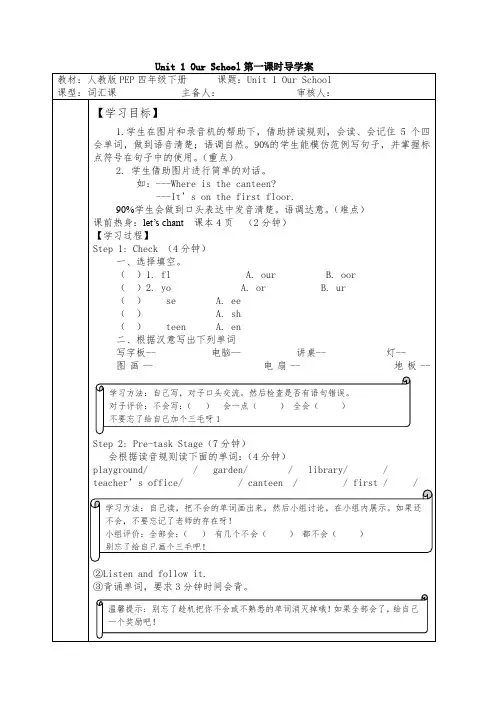
Unit 1 Our School第二课时导学案⑵试着说一说--- Do you have a library? _______________________________---Yes. _______________________________--- Do you have lunch at school?________________________________ ---Yes. ⑶小小讲解员(语法天地)Step3:While-task Stage①Using some phrases instead of some phrases in the conversation 我能围绕重点句型,拓展话题表演,创编情景对话。
如--- Do you have a library? _______________________________ ---Yes. _______________________________--- Do you have lunch at school?________________________________ ---Yes.③ Show (10分钟)孩子们,大显伸手的时候到了,赶紧来分享自己的学习成果吧!任务条:提示:小组长要分配好角色,每组展示不得超过3分钟。
展示特别精彩的,有意思的酌情加分呀!每项10分。
Step 4 Post- task Stage一、选择正确答案(15分)( ) this the washroom? _______温馨小提示:点评时可依据语音语调标准、流畅, 表情动作自然大方 同学们,你们知道吗?本课句型有一个询问时间的问句,是:What time is it?It ’s …It ’s time for千万要记住呀!Task1:借助所给的图片(切记图片不要重复),根据今天所学的句型编一组对话。
温馨小贴士:可以用图片和钟表;进行替换联系。

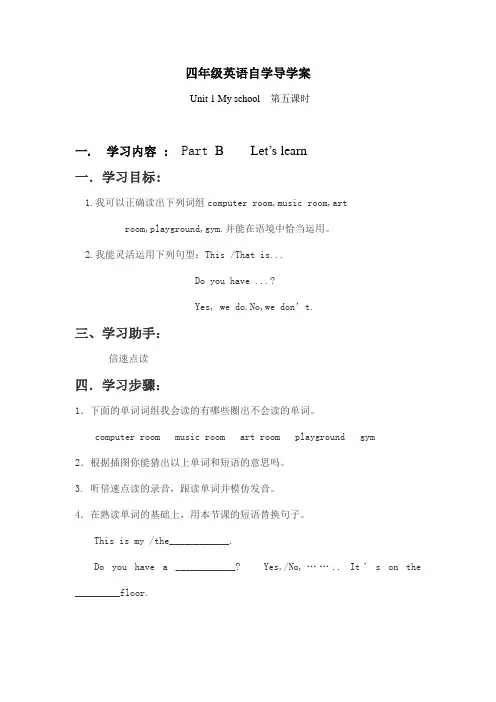
四年级英语自学导学案Unit 1 My school第五课时一. 学习内容 : Part B Let’s learn一.学习目标:1.我可以正确读出下列词组computer room,music room,artroom,playground,gym.并能在语境中恰当运用。
2.我能灵活运用下列句型:This /That is...Do you have ...?Yes, we do.No,we don’t.三、学习助手:倍速点读四.学习步骤:1.下面的单词词组我会读的有哪些圈出不会读的单词。
computer room music room art room playground gym2.根据插图你能猜出以上单词和短语的意思吗。
3. 听倍速点读的录音,跟读单词并模仿发音。
4.在熟读单词的基础上,用本节课的短语替换句子。
This is my /the____________.Do you have a ____________? Yes,/No,…….. It’s on the _________floor.课堂检测(一)根据汉意写出下列单词1.计算机房_____2.音乐教室____3.美术教室___4.操场_______体育馆___(二)好朋友,手牵手,连一连。
1.Draw A.on the playground.2.Read B.in the music room.3.Play C.in the library.4.Sing D.in the art room.完成情况:()家长签名:____________第五课时答案(一)puter room 2.music room 3. art room 4. playground 5. gym(二)1.D 2.C 3. A 4.B。
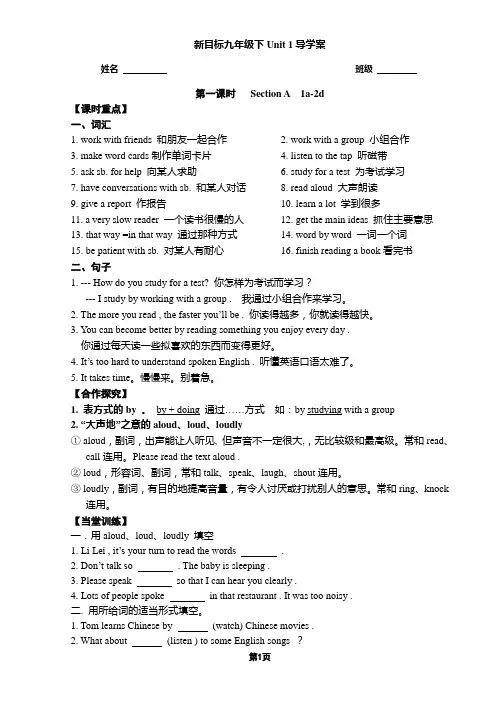
第一课时Section A 1a-2d【课时重点】一、词汇1. work with friends 和朋友一起合作2. work with a group 小组合作3. make word cards制作单词卡片4. listen to the tap 听磁带5. ask sb. for help 向某人求助6. study for a test 为考试学习7. have conversations with sb. 和某人对话8. read aloud 大声朗读9. give a report 作报告10. learn a lot 学到很多11. a very slow reader 一个读书很慢的人12. get the main ideas 抓住主要意思13. that way =in that way 通过那种方式14. word by word 一词一个词15. be patient with sb. 对某人有耐心16. finish reading a book看完书二、句子1. --- How do you study for a test? 你怎样为考试而学习?--- I study by working with a group . 我通过小组合作来学习。
2. The more you read , the faster you’ll be . 你读得越多,你就读得越快。
3. You can become better by reading something you enjoy every day .你通过每天读一些拟喜欢的东西而变得更好。
4. It’s too hard to understand spoken English . 听懂英语口语太难了。
5. It takes time。
慢慢来。
别着急。
【合作探究】1. 表方式的by 。
by + doing 通过……方式如:by studying with a group2. ―大声地‖之意的aloud、loud、loudly① aloud,副词,出声能让人听见, 但声音不一定很大,,无比较级和最高级。
四年级英语自学导学案
Unit 1 My school第一课时
一、学习内容: Part A Let’s talk
二、学习目标:
1、我能够理解对话大意;
2、我能用正确的语音语调朗读对话;
3、我能在语境中运用句型Where’s the …? It’s on the second floor.
Is this the …? Yes, it is./No, it isn’t.询问并回答学校设施的位置。
三、学习助手:
倍速点读
四、学习步骤:
(1).在预习4页Let’s talk之前先熟练朗读下列句子并思考每句话的意思:
Where is the ruler? It’s in the desk.
Where is the book? It’s on the teacher’s desk
(2)观察课文插图,找出对话中出现的人物并回答问题:
Who is Mike? Who is Miss White?
(3)快速读对话并回答问题:Where is the teachers’ office?
Where is the library?
(4)再读对话,圈出不认识的单词。
(5)打开倍速点读,仔细听录音并跟读(三遍),注意刚才圈出的单词的读音。
(6)默读对话,检查自己是否已经理解了对话大意?
五、自我检测
请根据学习目标和下面的课堂检测,自测下本节课目标是否完成?你还有哪些问题需要向老师求助?
________________________________________________________________ ________________________________________________________________ 课堂检测
(一)从Ⅱ栏中选出Ⅰ栏句子的答语。
ⅠⅡ
( )1.Where is the teachers’
office? A.Oh. It’s beautiful.
( )2.Is this the
playground?
B.Yes, I do.
( )3.Do you have a
library?
C.It’s on the first floor.
( )4.How many desks are there in your
classroom? D.No, it isn’t.
( )5.Look! This is our garden. E.There are thirty-five.
(二)选词填空
1.The library is on the _____floor.(two/second)
2.The teachers’ office is _________to (near/next)the library.
完成情况:()
家长签名:______________
第一课时答案
(一)1.C 2.D 3. B 4. E 5.A
(二)1.second 2. next。